| Listing 1 - 10 of 14 | << page >> |
Sort by
|
Book
ISBN: 9781848872165 184887216X Year: 2012 Publisher: London : Atlantic,
Abstract | Keywords | Export | Availability | Bookmark
 Loading...
Loading...Choose an application
- Reference Manager
- EndNote
- RefWorks (Direct export to RefWorks)
Book
ISBN: 1040086535 1032626194 1040086527 9781040086520 9781040086537 9781032626192 Year: 2024 Publisher: Oxford : Taylor & Francis Group,
Abstract | Keywords | Export | Availability | Bookmark
 Loading...
Loading...Choose an application
- Reference Manager
- EndNote
- RefWorks (Direct export to RefWorks)
This book lays out key questions, practical challenges and 'common sense' concerns underlying the incorporation of Common Sense within machine learning algorithms for simulating intelligence, socializing robots, self-driving vehicles, personnel selection, reading, automatic text analysis, and text production.
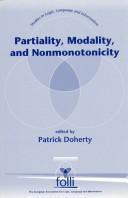
ISBN: 1575860317 1575860309 Year: 1996 Publisher: Stanford, Calif. : [Dordrecht?] : CSLI Publications ; FoLLI, the European Association for Logic, Language and Information,
Abstract | Keywords | Export | Availability | Bookmark
 Loading...
Loading...Choose an application
- Reference Manager
- EndNote
- RefWorks (Direct export to RefWorks)
Logic --- Modality (Logic) --- Formal languages. --- Reasoning --- Logique --- Modalité (Logique) --- Langages formels --- Raisonnement --- Commonsense reasoning. --- Modality (Logic). --- Modalité (Logique)
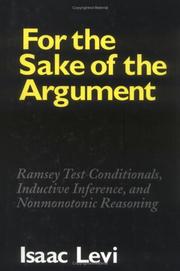
ISBN: 0521497132 9780521497138 9780511720161 9780521039017 0521039010 0511720165 Year: 1996 Publisher: Cambridge : Cambridge University Press,
Abstract | Keywords | Export | Availability | Bookmark
 Loading...
Loading...Choose an application
- Reference Manager
- EndNote
- RefWorks (Direct export to RefWorks)
This book by one of the world's foremost philosophers in the fields of epistemology and logic offers an account of suppositional reasoning relevant to practical deliberation, explanation, prediction and hypothesis testing. Suppositions made 'for the sake of argument' sometimes conflict with our beliefs, and when they do, some beliefs are rejected and others retained. Thanks to such belief contravention, adding content to a supposition can undermine conclusions reached without it. Subversion can also arise because suppositional reasoning is ampliative. These two types of nonmonotonic logic are the focus of this book. A detailed comparison of nonmonotonicity appropriate to both belief contravening and ampliative suppositional reasoning reveals important differences that have been overlooked.
Commonsense reasoning. --- Conditionals (Logic) --- Hypothesis. --- Induction (Logic) --- Inference. --- Nonmonotonic reasoning. --- Conditionals (Logic). --- Induction (Logic). --- Commonsense reasoning --- Hypothesis --- Inference --- Nonmonotonic reasoning --- Non-monotonic reasoning --- Reasoning --- Ampliative induction --- Induction, Ampliative --- Inference (Logic) --- Inductive logic --- Logic, Inductive --- Logic --- Assumption --- Supposition --- Science --- Conditional statements (Logic) --- Grammar, Comparative and general --- Common sense reasoning --- Methodology --- Induction (logique) --- Arts and Humanities --- Philosophy --- Philosophie --- Artificial intelligence --- Logique --- Knowledge representation
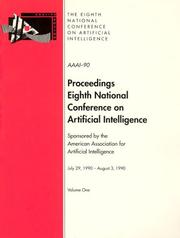
ISBN: 026251057X 9780262510578 Year: 1990 Publisher: Menlo Park, Calif.: AAAI,
Abstract | Keywords | Export | Availability | Bookmark
 Loading...
Loading...Choose an application
- Reference Manager
- EndNote
- RefWorks (Direct export to RefWorks)
681.3*I2 --- Artificial intelligence. AI --- 681.3*I2 Artificial intelligence. AI --- Artificial intelligence --- Congresses --- Knowledge Acquisition --- Machine learning --- Intelligent Interfaces --- Education and Ai --- Vision --- Natural Language --- Robotics --- Proceedings --- Knowledge --- Aaai --- Commonsense Reasoning --- Cognitive Modeling --- Automated Reasoning
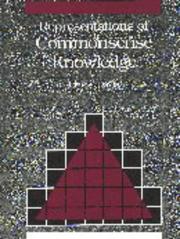
ISSN: 10469567 ISBN: 1558600337 9781558600331 Year: 1990 Publisher: San Mateo, Calif.: Morgan Kaufmann,
Abstract | Keywords | Export | Availability | Bookmark
 Loading...
Loading...Choose an application
- Reference Manager
- EndNote
- RefWorks (Direct export to RefWorks)
Artificial intelligence --- -Connectionism --- -Connexionism --- Cognition --- AI (Artificial intelligence) --- Artificial thinking --- Electronic brains --- Intellectronics --- Intelligence, Artificial --- Intelligent machines --- Machine intelligence --- Thinking, Artificial --- Bionics --- Cognitive science --- Digital computer simulation --- Electronic data processing --- Logic machines --- Machine theory --- Self-organizing systems --- Simulation methods --- Fifth generation computers --- Neural computers --- Data processing --- -Congresses --- Gezond verstand --- Artificial intelligence. Robotics. Simulation. Graphics --- Commonsense reasoning --- Common sense reasoning --- Reasoning --- Artificial intelligence. --- Commonsense reasoning. --- Connectionism --- Congresses. --- Common sense. --- Reasoning.

ISBN: 0203724461 1299054749 1135776288 9781135776282 9780203724460 9781299054745 9780203943809 0203943805 9781135916534 1135916535 9781135916480 1135916489 9781135916527 1135916527 9781135776428 1135776423 9781135776350 1135776350 041595536X 9780415955362 0415955378 9780415955379 Year: 2013 Publisher: Hoboken Taylor and Francis
Abstract | Keywords | Export | Availability | Bookmark
 Loading...
Loading...Choose an application
- Reference Manager
- EndNote
- RefWorks (Direct export to RefWorks)
Using arresting case studies of how ordinary people understand the concepts of race, class, and gender, Celine-Marie Pascale shows that the peculiarity of commonsense is that it imposes obviousness-that which we cannot fail to recognize. As a result, how we negotiate the challenges of inequality in the twenty-first century may depend less on what people consciously think about ""difference"" and more on what we inadvertently assume. Through an analysis of commonsense knowledge, Pascale expertly provides new insights into familiar topics. In addition, by analyzing local practices in the cont
Classism - United States. --- Classism -- United States. --- Commonsense reasoning - United States. --- Commonsense reasoning -- United States. --- Discourse analysis. --- Racism - United States. --- Racism -- United States. --- Racism in language. --- Sexism - United States. --- Sexism -- United States. --- Sexism in language - United States. --- Sexism in language -- United States. --- Social classes in mass media. --- Social perception - United States. --- Social perception -- United States. --- Social perception --- Classism --- Racism --- Sexism --- Sexism in language --- Racism in language --- Social classes in mass media --- Commonsense reasoning --- Discourse analysis --- Sociology & Social History --- Social Sciences --- Social Conditions --- Discourse grammar --- Text grammar --- Semantics --- Semiotics --- Common sense reasoning --- Reasoning --- Mass media --- Language and racism --- Racism and language --- Racist language --- Language and languages --- Sexist language --- Language and sex --- Nonsexist language --- Attitude (Psychology) --- Prejudices --- Social classes --- Cognition, Social --- Interpersonal perception --- Social cognition --- Interpersonal relations --- Perception --- Social cognitive theory --- Sex differences
Book
ISBN: 0674259920 0674259939 Year: 2021 Publisher: Cambridge, Massachusetts : Harvard University Press,
Abstract | Keywords | Export | Availability | Bookmark
 Loading...
Loading...Choose an application
- Reference Manager
- EndNote
- RefWorks (Direct export to RefWorks)
“Artificial intelligence has always inspired outlandish visions—that AI is going to destroy us, save us, or at the very least radically transform us. Erik Larson exposes the vast gap between the actual science underlying AI and the dramatic claims being made for it. This is a timely, important, and even essential book.” —John Horgan, author of The End of Science Many futurists insist that AI will soon achieve human levels of intelligence. From there, it will quickly eclipse the most gifted human mind. The Myth of Artificial Intelligence argues that such claims are just that: myths. We are not on the path to developing truly intelligent machines. We don’t even know where that path might be. Erik Larson charts a journey through the landscape of AI, from Alan Turing’s early work to today’s dominant models of machine learning. Since the beginning, AI researchers and enthusiasts have equated the reasoning approaches of AI with those of human intelligence. But this is a profound mistake. Even cutting-edge AI looks nothing like human intelligence. Modern AI is based on inductive reasoning: computers make statistical correlations to determine which answer is likely to be right, allowing software to, say, detect a particular face in an image. But human reasoning is entirely different. Humans do not correlate data sets; we make conjectures sensitive to context—the best guess, given our observations and what we already know about the world. We haven’t a clue how to program this kind of reasoning, known as abduction. Yet it is the heart of common sense. Larson argues that all this AI hype is bad science and bad for science. A culture of invention thrives on exploring unknowns, not overselling existing methods. Inductive AI will continue to improve at narrow tasks, but if we are to make real progress, we must abandon futuristic talk and learn to better appreciate the only true intelligence we know—our own.
Artificial intelligence. --- Neurosciences. --- Natural language processing (Computer science) --- Logic. --- Intellect. --- Inference. --- AI and futurism. --- AI and innovation. --- AI and neuroscience. --- AI and superintelligence. --- AI and the Turing test. --- AI hype. --- AI winter. --- commonsense reasoning. --- limitations of AI. --- natural language understanding. --- the future of AI. --- the problem with AI.
Book
ISBN: 3642141587 3642141595 Year: 2010 Publisher: New York : Springer,
Abstract | Keywords | Export | Availability | Bookmark
 Loading...
Loading...Choose an application
- Reference Manager
- EndNote
- RefWorks (Direct export to RefWorks)
An important aspect in the formalisation of common-sense reasoning is the construction of a model of what an agent believes the world to be like to help in her reasoning process. This model is often incomplete or inaccurate, but new information can be used to refine it. The study of techniques that achieve this in a rational way is the task of the discipline of belief revision, with which this book is concerned. There are three key elements to the book's approach. Firstly, the methodology of logic by translation. A specific instance of this is the idea of revision by translation. Revision for a foreign logic is done via its translation into a well-known logic, usually classic logic. Secondly, the technique of meta-level/object-level movement, where we bring some operation defined at the meta-level of a logic into its object level. In this book, we bring the operation of deletion to the object level. Finally, through Labelled Deductive Systems, we use the context of the revision to finetune its operation and illustrate the idea through the presentation of various algorithms. The book is suitable for researchers and postgraduates in the areas of artificial intelligence, database theory, and logic.
Artificial intelligence -- Mathematics. --- Commonsense reasoning -- Automation. --- Logic, Symbolic and mathematical. --- Commonsense reasoning --- Artificial intelligence --- Logic, Symbolic and mathematical --- Mechanical Engineering --- Philosophy --- Engineering & Applied Sciences --- Logic --- Computer Science --- Mechanical Engineering - General --- Philosophy & Religion --- Automation --- Mathematics --- Information Technology --- Artificial Intelligence --- Logic. --- Algorithms. --- Algorism --- Argumentation --- Deduction (Logic) --- Deductive logic --- Dialectic (Logic) --- Logic, Deductive --- Computer science. --- Database management. --- Artificial intelligence. --- Computer Science. --- Artificial Intelligence (incl. Robotics). --- Database Management. --- Algebra --- Arithmetic --- Intellect --- Psychology --- Science --- Reasoning --- Thought and thinking --- Foundations --- Methodology --- Artificial Intelligence. --- Data base management --- Data services (Database management) --- Database management services --- DBMS (Computer science) --- Generalized data management systems --- Services, Database management --- Systems, Database management --- Systems, Generalized database management --- Electronic data processing --- AI (Artificial intelligence) --- Artificial thinking --- Electronic brains --- Intellectronics --- Intelligence, Artificial --- Intelligent machines --- Machine intelligence --- Thinking, Artificial --- Bionics --- Cognitive science --- Digital computer simulation --- Logic machines --- Machine theory --- Self-organizing systems --- Simulation methods --- Fifth generation computers --- Neural computers
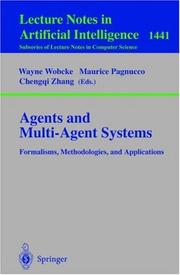
ISSN: 03029743 ISBN: 3540647694 9783540647690 354068722X Year: 1998 Volume: 1441 Publisher: Berlin, Heidelberg : Springer Berlin Heidelberg : Imprint: Springer,
Abstract | Keywords | Export | Availability | Bookmark
 Loading...
Loading...Choose an application
- Reference Manager
- EndNote
- RefWorks (Direct export to RefWorks)
This book constitutes the thoroughly refereed post-workshop proceedings of three workshops held in conjunction with the 10th Australian Joint Conference on Artificial Intelligence in Perth, Australia, in December 1997. The 17 revised full papers presented were carefully reviewed for inclusion in the book. The book is divided into sections on formal methods of agency, reasoning agents, communication and coordination, social interaction, and practical issues for distributed artificial intelligence systems.
Distributed artificial intelligence --- Intelligent agents (Computer software) --- Commonsense reasoning --- Common sense reasoning --- Computer science. --- Computer communication systems. --- Software engineering. --- Artificial intelligence. --- Computer Science. --- Artificial Intelligence (incl. Robotics). --- Computer Communication Networks. --- Software Engineering. --- AI (Artificial intelligence) --- Artificial thinking --- Electronic brains --- Intellectronics --- Intelligence, Artificial --- Intelligent machines --- Machine intelligence --- Thinking, Artificial --- Bionics --- Cognitive science --- Digital computer simulation --- Electronic data processing --- Logic machines --- Machine theory --- Self-organizing systems --- Simulation methods --- Fifth generation computers --- Neural computers --- Computer software engineering --- Engineering --- Communication systems, Computer --- Computer communication systems --- Data networks, Computer --- ECNs (Electronic communication networks) --- Electronic communication networks --- Networks, Computer --- Teleprocessing networks --- Data transmission systems --- Digital communications --- Electronic systems --- Information networks --- Telecommunication --- Cyberinfrastructure --- Network computers --- Informatics --- Science --- Distributed processing --- Congresses --- Artificial Intelligence. --- Distributed artificial intelligence - Congresses --- Intelligent agents (Computer software) - Congresses --- Commonsense reasoning - Congresses --- Computer networks.
| Listing 1 - 10 of 14 | << page >> |
Sort by
|

 Search
Search Feedback
Feedback About UniCat
About UniCat  Help
Help News
News